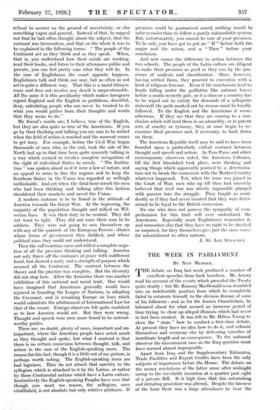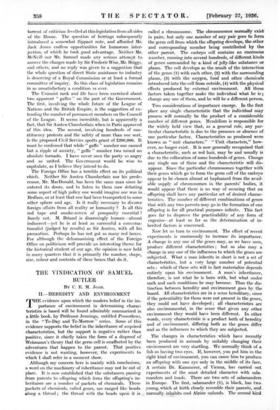THE WEEK IN PARLIAMENT
BY NEW MEMBER.
Apart from Iraq and the Supplementary Estimates, Trade Facilities and Export Credits have been the only subjects of importance before the House. The debate on the money resolutions of the latter arose after midnight owing to the inevitable incursion at a quarter past eight of a private Bill. It is high time that this astonishing and irritating procedure was altered. Despite the lateness of the hour there was a large attendance to hear the torrent of criticism levelled at this legislation from all sides of the House. The question of herrings subsequently introduced a somewhat flippant note, and afforded Mr. Jack Jones endless opportunities for humorous inter- jection, of which he took good advantage. Neither Mr.. McNeill nor Mr. Samuel made any serious attempt to, answer the charges made by Sir Frederic Wise, Mr. Briggs, and others, and no reply was given to a suggestion that the whole question of direct State assistance to industry is deserving of a Royal Commission or at least a formal committee of inquiry. So this class of legislation remains in as unsatisfactory a condition as ever.
The Unionist rank and file have been exercised about two apparent " gaffes " on the part of the Government.
The first, involving the whole future of the League of Nations and the British Empire, is the suggestion of ex- tending the number of permanent members on the Council of the League. It seems incredible, but is apparently a fact, that Sir Austen Chamberlain when in Paris approved of this idea. The second, involving hundreds of con- stituency protests and the safety of more than one seat, is the proposed Civil Service sports grant of £200,000. It, must be confessed that while " gaffe " number one caused but a ripple of anxiety, " gaffe " number two raised an absolute tornado. I have never seen the party so angry and so united. The Government would be wise to capitulate, as I believe they intend to do.
The Foreign Office has a terrible effect on its political chiefs. Neither Sir Austen Chamberlain nor his prede- cessor, Mr. MacDonald, has been the same man since he entered its doors, and to listen to them now debating some aspect of high policy one would imagine one was in .
Bedlam, or at least that one had been transported to some other sphere and age. Is it really necessary to divorce foreign affairs from all reality or humanity ? Is all this red tape and smoke-screen of pomposity essential ? Surely not. M. Briand is disarmingly human—almost indiscreet—yet he is at least as successful a conversa- tionalist (judged by results) as Sir Austen, with all his precaution. Perhaps he has not got so many red boxes.
For although the dehumanizing effect of the Foreign Office on politicians will provide an interesting theme for the historical student of our age, the opinion is now held in many quarters that it is primarily the number, shape, size, colour and contents of these boxes that do it.























































 Previous page
Previous page